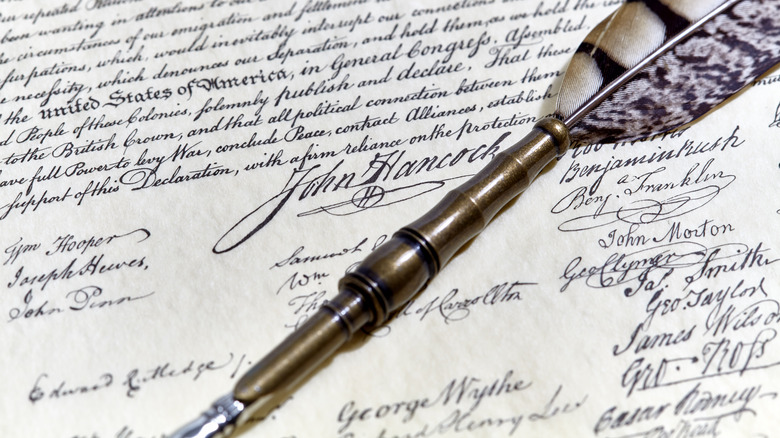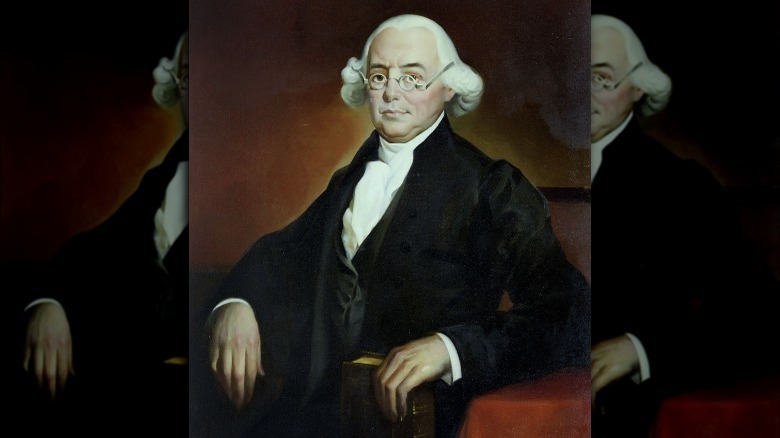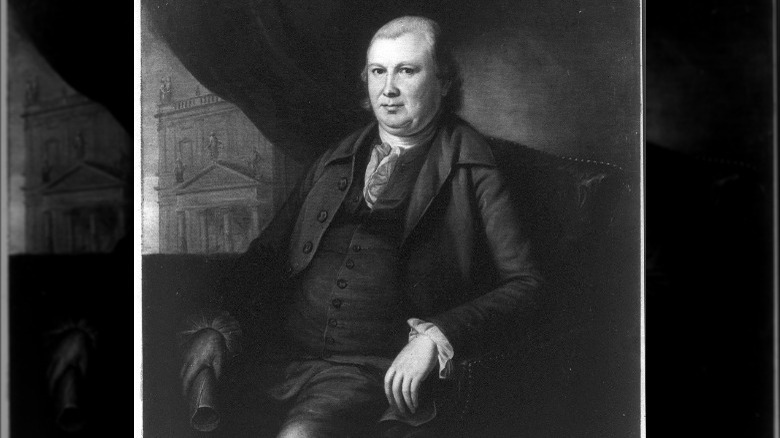Here's Why Two Declaration Of Independence Signers Landed In Prison
On July 4, 1776, the Continental Congress in Philadelphia formally approved the Declaration of Independence, the document that asserted American independence from British rule. Fifty-six men from across America's 13 original colonies signed that historic document. When we imagine these signatories – America's "Founding Fathers" – we typically picture them as unimpeachable, larger-than-life heroes. But in many ways, the Founding Fathers were ordinary men, as prone to error and failure as any of us. In fact, two signatories of the Declaration of Independence — James Wilson and Robert Morris, both of whom had represented Pennsylvania at the Continental Congress — would go on to spend time in prison.
As US History.org reports, James Wilson was born in Scotland in 1742, emigrating to the United States in 1766. After passing the bar exam, Wilson established a successful legal practice in Reading, Pennsylvania. Wilson was an outspoken critic of British colonial rule, and he was elected to represent Pennsylvania at the Continental Congress in 1775. There, Wilson voted in favor of independence, but only after confirming that it was popular among his constituents.
Following this, Wilson spent many more years in politics, primarily as a member of Pennsylvania's state congress. However, during those years, Wilson took up both gambling and land speculation, borrowing large sums of money to fuel his addictions. Ironically, in spite of his personal financial troubles, Wilson was appointed a director of the Bank of North America.
James Wilson spent time in debtors' prison while serving as a justice on the Supreme Court
As US History.org explains, Wilson racked up debt, but he was able to avoid legal consequences for many years. In fact, when the U.S. Constitution was ratified in 1788, Wilson was appointed to serve as a justice on the newly-established Supreme Court. Soon after, however, Wilson's bad fortune caught up to him. In the 1790s, after more land speculation and an economic crash, Wilson was arrested for his debts. Wilson was forced to spend a brief amount of time in a debtor's prison while still serving as a Supreme Court justice. Wilson died of a stroke in 1798, bringing an abrupt end to his decade of misfortune.
But Robert Morris, another signatory of the Declaration of Independence, was even less fortunate than Wilson. US History.org reports that Morris emigrated from England to Philadelphia at the age of 10 in 1744. In his late teens, Morris became a partner of a successful shipping firm. Over the next few decades, that position would make Morris a very wealthy man.
When the British taxes of the 1760s hurt Morris' business, he decided to side with those seeking independence. Like Wilson, he represented Pennsylvania at the Continental Congress, and signed the Declaration of Independence. In the years that followed, Morris also used his vast personal fortune to help finance the Revolutionary War effort.
After helping fund the Revolutionary War, Robert Morris spent three years in debtors' prison
Toward the end of the Revolutionary War, Robert Morris helped the fledgling United States get its financial situation in order. Per US History.org, Morris devised a plan for a National Bank, which he submitted to Congress; it was approved, and became the Bank of North America — the same bank for which James Wilson was an original director. The bank was a great success in helping the United States finance the Revolutionary War and financially recover from it afterwards.
Morris would go on to serve as Financial Agent of the United States, a delegate to the 1787 Constitutional Convention, and Senator for Pennsylvania. US History.org reports that Morris was also appointed Secretary of the Treasury by George Washington, but he declined the position, recommending that Washington choose Alexander Hamilton instead.
Yet, despite all his wealth and success, Morris' later life, like Wilson's, was plagued with debt. Morris' personal fortune declined over many years, with his remaining wealth lost to land speculation — the same scheme that had brought ruin to Wilson. Historian Alan Axelrod writes that, by 1798, Morris was "unable to pay his taxes or the interest on his loans." In February of that year, Morris was arrested and sent to a debtor's prison in Philadelphia, where he spent three-and-a-half years — a far longer sentence than Wilson. Following his release in 1801, Morris lived a quiet life until his death five years later.


